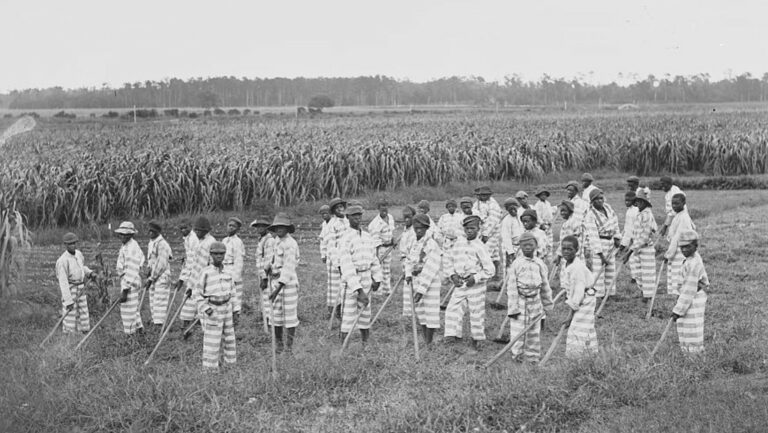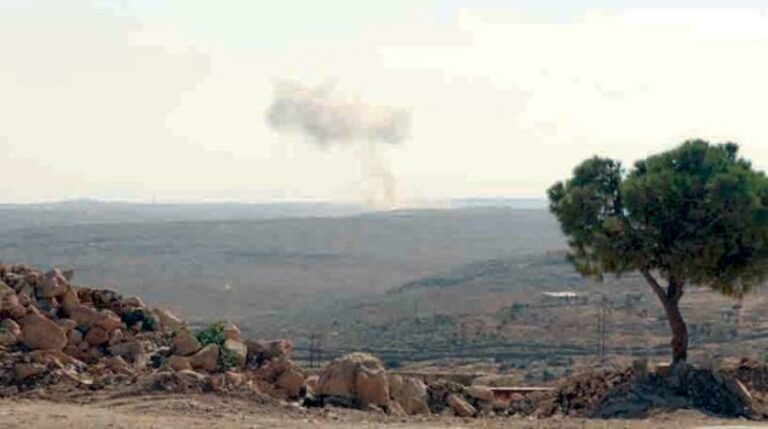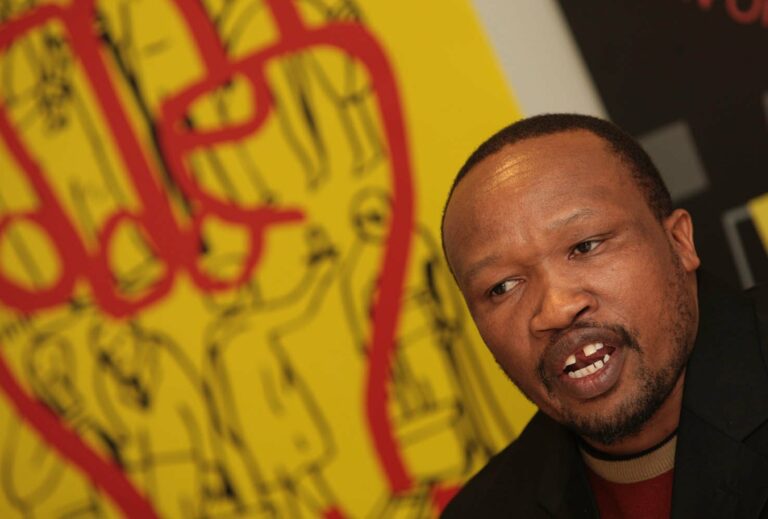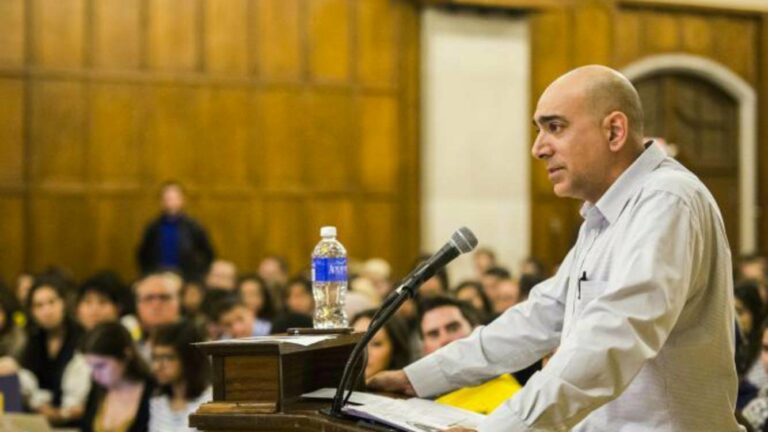Glen Ford, renowned journalist and activist, died on July 29th. Glen was a brilliant analyst filled with a militant spirit. In 2013 Glen was interviewed by Paul Jay on Reality Asserts itself.
Glen Ford, executive editor of Black Agenda Report, spoke with Real News Senior Editor Paul Jay about his upbringing as a “red diaper baby.”
“My mother was a lifelong activist,” said Ford, “and so there were always leaflets and pamphlets and discussions of how to organize people and little triumphs and little victories and what she thought were big triumphs and big victories. My father was a disc jockey in New Jersey and then went back down south where he came from, Georgia, and became the first black man to have a television show in the Deep South, Rockin’ with the Deuce.”
“I was batted back and forth between these two influences, my mother being a very political person and my father being deeply involved in the entertainment industry. So I developed a bifurcated brain,” said Ford.
Glen also spoke about his mother’s deep ties with the black community in Jersey City, NJ, and described his first exposure to white children when he started eighth grade.
“A wall of hostility and the crudest kind of conduct I’d ever witnessed among kids. You know, when you grow up in segregation, you imagine how the other half, the white half lives, but you don’t know. All you get in terms of information is from the television and other forms of white propaganda. But when I was actually exposed to these foul-mouthed young’uns, I was really shocked that from a cultural standpoint these were some very crude people. That was my first reaction to being immersed in a mostly white environment in terms of school, how crude these guys were.”
Ford also talked about his experience in the army during the Vietnam war as a soldier and political activist combating racism.
“I think, and I thought at the time, that the collapse of the American effort in Vietnam was at least as much based on the fact that the black soldier did not allow himself to be moved around by the chain of command. I believe that that had as much to do with the U.S. withdrawal as demonstrations back home,” said Ford.
“American apartheid was the reality of the day. You don’t just derive some of your experience from that. You are immersed in it,” said Ford.
STORY TRANSCRIPT
PAUL JAY, SENIOR EDITOR, TRNN: Welcome to The Real News Network. I’m Paul Jay in Baltimore. And welcome to Reality Asserts Itself.
In these interviews I usually start with a bit of biographical information about our guest. And we talked more about why they know–why they think what they think rather than what they think. And that’s what we’re going to do today.
So now joining us in Baltimore is Glen Ford. Glen is currently the executive editor of Black Agenda Report, but before that he was the White House and State Department and Capitol Hill correspondent, as well as D.C. bureau chief, for the Mutual Black radio network from 1974 to 1977. He was also the founder and host of America’s Black Forum, which was the first nationally syndicated black news interview show on commercial television, and many things before that.
Thanks for joining us, Glen.
GLEN FORD, EXECUTIVE EDITOR, BLACK AGENDA REPORT: Thank you for having me, Paul.
JAY: So let’s kind of start early in your childhood.
And as you know, those of you who watch Reality Asserts Itself, later on we’re going to talk about some of the issues Glen is preoccupied with.
But for now let me just ask–I personally grew up in a house where politics and news were talked about quite a bit. I mean, when I was six or seven, my parents were giving me newspapers and things to read. What was the atmosphere like in your house?
FORD: Well, my mother and father split, that is, became divorced, rather early in my life. Their concerns were rather different. My mother was a lifelong activist, and so there were always leaflets and pamphlets and discussions of how to organize people and little triumphs and little victories and what she thought were big triumphs and big victories. My father was a disc jockey in New Jersey and then went back down south where he came from, Georgia, and became the first black man to have a television show in the Deep South, Rockin’ with the Deuce—
JAY: Rockin’ with the Deuce.
FORD: –in 1958 in Columbus, Georgia.
JAY: Your mother was white Irish and your father was a black man from Georgia. Okay. And was he–he wasn’t very political.
FORD: Well, they met in the Communist Party, where my mother had been a young communist, and my father met her at one of the few places where they had interracial gatherings in Jersey City, New Jersey, at a Jewish community center. And I believe he drifted into the left-wing politics through his association with her.
JAY: And then there has been this historical connection between left-wing Jews, black activism, I mean, in the Communist Party for sure, but not only, no?
FORD: Well, the Communist Party–and I don’t know where people get their figures, but it is estimated that in the ’30s the Communist Party was about 20 percent black. And that really is phenomenal when you understand that most black folks, a majority of black people lived in the Deep South, where just to be an uppity and engaged black person was to be in danger for your life, and to be a black communist person was to commit suicide. And so there was a period in the late ’30s and through much of the ’40s in which you could not be a black member of the intelligentsia without being surrounded by folks who had connections one way or the other to the Communist Party, because the Communist Party was the only political organization, national organization in the United States that was unequivocally in favor of racial integration. And so that was the window on an integrated society that was available to black folks of that time.
JAY: So after your parents broke up, did you live more with your mother, with your father? You went back and forth?
FORD: Oh, I was batted back and forth between these two influences, my mother being a very political person and my father being deeply involved in the entertainment industry. So I developed a bifurcated brain.
JAY: You probably heard some sirens. But we are in our temporary studio, and this is Baltimore. There will be sirens.
FORD: As long as they are not coming after me.
JAY: So far.
So when do you start to become aware of politics, following news, that sort of thing?
FORD: I think I was always aware of politics. That didn’t mean that I had a political analysis at the age of five, but I think I was–I had a political consciousness, and of course that consciousness was left by the time I was ten years old, certainly.
JAY: And in terms of bifurcating your brain, it’s not just about politics and music; it’s also about a white parent and a black parent. And how are you thinking of who you are? And how are you perceived?
FORD: Well, my mother became totally integrated into the black community of Jersey City, New Jersey, so much so that I believe that lots of folk thought that she was just a very light-skinned black person. She was secretary of the NAACP, totally immersed in the politics of the black community there. I didn’t feel any pulls from the white side, because she was so deeply immersed in the black side.
JAY: So you growing up, then, you don’t feel this kind of black/white bifurcation, to use your word. You felt you were black growing up in a black community and your mother was your mother.
FORD: And until I was in the eighth grade, I went to 100 percent black schools, whether in Jersey City, New Jersey, where they were de facto segregated, or in Columbus, Georgia, which was segregated by law. I didn’t go to school with any white kids until I was in the eighth grade. And that was very interesting, because my mother, who was secretary of the NAACP–the NAACP had been fighting for opening enrollment in Jersey City for many years and they finally won it. But nobody in the black community wanted to send their kids to any of these white schools, ’cause these were some very hostile white people, and so were their children, and no one wanted to submit themselves to that kind of treatment.
JAY: And how do you grow up feeling that hostility? And you don’t go to the white school. But how aware are you of that?
FORD: Oh, I did wind up going in the eighth grade to this white school, because the NAACP members found that nobody was going to take up this voluntary open enrollment opportunity unless they sent at least one of their children. So I, being the firstborn, was designated, and that was my first exposure to white kids. And it was not pleasant.
JAY: So you show up day one. You’ve been in a black community and black schools, and now, partly because of your mom’s politics, you are now in a white school facing a wall of hostility.
FORD: A wall of hostility and the crudest kind of conduct I’d ever witnessed among kids. You know, when you grow up in segregation, you imagine how the other half, the white half lives, but you don’t know. All you get in terms of information is from the television and other forms of white propaganda. But when I was actually exposed to these foul-mouthed young’uns, I was really shocked that from a cultural standpoint these were some very crude people. That was my first reaction to being immersed in a mostly white environment in terms of school, how crude these guys were.
JAY: And did you want out?
FORD: I wanted out, but I couldn’t, because my mother’s reputation as a member of the NAACP was at stake. There had to be some kids going to these mostly white schools.
JAY: And did you understand the politics of that? Or did you kind of resent the–.
FORD: Oh, yeah, I resented it deeply. Why don’t you send my younger brother and sister? They haven’t already established their racial attitudes. Maybe it’ll do them some good to get an integrated education. I’m already done.
JAY: So that’s grade eight. And then I guess it’s not long before you’re in high school. What kind of high school do you go to?
FORD: I went to high school in Jersey City, and also in Columbus, Georgia. The high school in Jersey City was integrated, I’d say about half black and Latino. (At that time, Latino meant Puerto Rican in Jersey City.) In Columbus, Georgia, where I spent about half of my high school years, that of course–that system was still under de jure segregation.
JAY: And how much of your life experience is about this wall of racism? Or how much does it recede in high school, other issues come to the fore? I mean, how much is this your day-to-day issues?
FORD: American apartheid was the reality of the day. You don’t just derive some of your experience from that. You are immersed in it.
JAY: And did you get active at all? You come from a very activist family, or your mother at least. Do you get active in high school?
FORD: My mother would drag all of us off to leaflet the housing projects, and whatever other projects she was involved in. So as far back as I can remember there were–at least in the Jersey City side of my life, there were constant political activities. I thought that that was a rather normal way to live.
During the half of my youth that I spent in Columbus, Georgia, a lot of that was following my follower father around, who was tremendously popular as the first black person with a television show in the Deep South, as he did nightly record hops all over Alabama and Georgia. And I got to meet Jackie Wilson and James Brown, and Aretha Franklin when he she was, oh, maybe 20 years old, all the stars of the day. I got kind of jaded in that regard.
JAY: What felt–.
FORD: Very different worlds.
JAY: Very different. What felt–.
FORD: And it wasn’t about race that was different. It was about the different avocations of my mother and father, she being the political person totally immersed in the politics of black New Jersey and he being a kind of star. He’s part of the black radio hall of fame museum in Atlanta.
JAY: And do you have his voice? ‘Cause you’ve got a voice made for radio.
FORD: Well, I don’t have my mother’s voice, obviously.
JAY: Now, I know from chatting with you that it wasn’t–at a very young age, 17, you joined the Army. And this is in the midst of the Vietnam War. What leads up to that?
FORD: Oh, I dropped out of high school for reasons that are too boring to elaborate, and then discovered that I had no skills and there was nothing for me to do. And so I went into the Army.
This had nothing to do with my politics. I was for the Vietnamese at that time. Remember, I’m a red diaper baby. But I’m also a kid who had just turned 17 years old, and I did not feel that I had any other options.
JAY: But what did your mother think? I mean, this is–there’s already a pretty significant antiwar movement. In political households, there’s–that’s all anyone’s talking about is the Vietnam War and opposition to the Vietnam War.
FORD: Well, she threatened often enough to sign me into juvenile hall as an incorrigible child. So I suppose she was at her wits’ end with me and signed me in at the height of the Vietnam War.
JAY: As a way to discipline you, a way to–.
FORD: Maybe she thought that that was a better option than those that I would have in Jersey City on the streets.
JAY: And you wanted to do this. I mean, you say that you had no other options, but there are lots of kids in your situation that had found other options.
FORD: Well, I wasn’t thinking too deeply about any of this, as I said. I was a 17-year-old kid who didn’t know quite what to do. I regretted it as soon as I had taken the oath, but I had three years of this ahead of me. I became a paratrooper so that at least I’d be in a unit that had some esprit de corps, and maybe that would make the time pass more enjoyably.
JAY: And what–in terms of this organized apartheid and this wall of racism, what was your life like in the Army?
FORD: In the Army these were political times, and black folks were organizing there. Of course, all of this was quite illegal, and even now I’m not going to talk about the kinds of organizing that we did, except to say that by 1969, when I had only a few months left in the Army (I was a sergeant by that time), the commanding general of the 82nd Airborne Division–it was a big surprise. He called all three of the brigades that were not in Vietnam–this was in Fort Bragg, North Carolina–onto this huge playing field there, and the first words out of his mouth were: I give up, gentlemen. And he conceded to all the demands that had been put forward by the black brigade. The black brigade operated at night conducting confrontations with the MPs and then leaving slips of paper behind with the lists of demands. And I was part of that.
JAY: So this black brigade was a brigade you guys created.
FORD: Yeah, it was actually five or six of us. But there were other small groups of black soldiers–
JAY: What were the demands?
FORD: –who were agitating.
Simple things that seem unimportant from today’s perspective. To be able to grow our hair as long as we wanted, to have mustaches and sideburns, but, on the more serious side, that there be–the chain of command respond to our complaints of racism at the platoon and company level, so that at the battalion level there would be a response and there would be no retaliation from company and platoon sergeants.
JAY: Now, you joined when you were only 17, so they couldn’t send you into combat right away.
FORD: Not when I was 17. When I get out of jump school, paratrooper school in Fort Benning, Georgia, there were 600 of us in that class. A handful of us were still not yet 18, and, of course, you can’t go into combat until you’re 18. And we were sent to Fort Bragg to the 82nd Airborne Division. The rest of the class, all of it went to the 173rd Airborne Brigade, which was in Vietnam, which promptly charged up Đắk Tô Mountain, which was a VC and North Vietnamese redoubt. And by the time that battle was over, there were PFCs commanding platoons. There were only two radio operators left in the whole brigade. And essentially the 173rd was knocked out of the war for the rest of the war.
JAY: Now, I know from–.
FORD: Everybody that I know was wounded or killed.
JAY: I know from the late ’60s, talking to American army deserters who came to Toronto where I grew up, especially African-American deserters, the level of political organizing in Vietnam amongst black soldiers, I’m not sure this story has really come out. He talked about how the black soldiers had their own political organization, more or less, within the Armed Forces. And they were actually having meetings with the North Vietnamese. They’re having actually–he told me–I can’t verify this, but he told me there was actually instances where black soldiers would make deals not to shoot snipers and snipers would make deals not to shoot black soldiers.
FORD: Before 1965, blacks were taking disproportionate casualties in Vietnam, and this was despite a policy by the Vietnamese to spare black soldiers if they possibly could. After 1965, when there was a huge buildup in the American military presence–went above 500,000 black soldiers, reached a critical mass, and essentially decided not to cooperate with the chain of command. And so units would not move. They refused to allow themselves to be used as cannon fodder. And the black casualty rate consequently went way down. It was no longer disproportionate to whites.
But that’s because of the resistance–passive, at least, sometimes quite active resistance–by the black soldiers. There were open gunbattles in many bases in Vietnam between the almost lily white MPs and black soldiers. It–I think, and I thought at the time, that the collapse of the American effort in Vietnam was at least as much based on the fact that the black soldier did not allow himself to be moved around by the chain of command. I believe that that had as much to do with the U.S. withdrawal as demonstrations back home.
And I think it’s borne out by what subsequently happened. It was the Joint Chiefs of Staff, it was the army brass that was pushing for an all-volunteer army, because Vietnam was a nightmare to them in terms of having this black ghetto army on their hands that they couldn’t–that would not listen to them. And we have seen under the volunteer army–I’ll give you an example. My unit, the 82nd Airborne, was 60 percent black at the line level. So was the hundred and 173rd. The 101st Airborne was slightly less black. Today, my old unit, the 82nd, is the whitest division in the U.S. Army, since 1973, with the all-volunteer army. They have made sure that the line units, the elite units of the U.S. Army, will not have a critical mass of black soldiers who present a wildcard to the Pentagon.
JAY: Okay. In the next segment of our interview, we’re going to pick up on Glen’s story as he becomes professional journalist–and a very imaginative and innovative black journalist–in Washington. Please join us for the next segment of Reality Asserts Itself with Glen Ford on The Real News Network.







where can i find part 2-5 of glen ford’s life story broadcast with paul jaay?
Here is a link to the Glen Ford Reality Asserts Itself Playlist – https://theanalysis.news/reality-asserts-itself/?_select_by_guest=glen-ford
Happy to have you as a viewer.